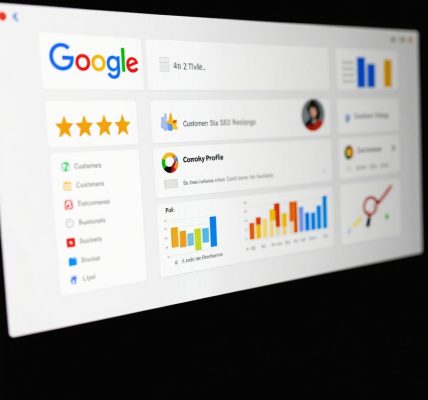Why Your Google Business Category Could Be the Secret Sauce You’re Missing
Imagine walking into a bustling marketplace where everyone shouts, but only a few get heard. That’s the digital bazaar we navigate daily, especially with Google My Business (GMB). Choosing the right category for your GMB profile isn’t just a checkbox—it’s the megaphone that amplifies your voice to the right crowd. If you’re still stuck on the generic “Local Business” or “Service Provider,” you might be whispering when you should be roaring.
Picking the Perfect Category: A Game of Strategic Tagging
Google offers thousands of categories, but the magic lies in selecting the ones that truly reflect your business’s soul while aligning with what your potential customers are searching for. The primary category is your flagship, the one that tells Google, “This is what I do best.” Secondary categories? They’re your supporting cast, expanding your reach without diluting your core identity.
Can picking the wrong category sink your local SEO ship?
Absolutely. It’s like setting sail with a faulty compass. Mismatched categories confuse Google’s algorithms, leading to poor local rankings and missed opportunities. For instance, a bakery labeling itself under “Cafe” might lose out on targeted searches from customers hunting for freshly baked bread, not just coffee.
Categories That Pack a Punch
From “Plumber” to “Digital Marketing Agency,” specificity wins the day. Businesses that nail down their niche categories tend to appear in more relevant local searches, increasing foot traffic and online engagement. Take inspiration from top-ranking profiles and see how they leverage categories to maximize visibility.
Need a deeper dive? Explore comprehensive strategies on mastering Google Business SEO and how to optimize your listing effectively.
How Do You Know Which Category Is Your Golden Ticket?
Start by imagining your customer’s search journey. What phrases do they type? Then, cross-reference with Google’s category list. Don’t hesitate to experiment and monitor your GMB Insights for performance shifts. And remember, updating your categories isn’t a one-and-done deal—it’s an evolving strategy as your business grows.
Expert Take: Why Categories Matter More Than Ever
According to Moz, precise categorization can significantly influence your local search rankings and click-through rates. As local SEO guru Darren Shaw notes, “Categories are the foundation of your local SEO strategy—they tell search engines what your business is about.” (Moz Local Search Ranking Factors 2024)
Ready to Amplify Your Google Business Reach?
Don’t let your business blend into the background noise. Take a moment now to review your Google Business categories. Are they as sharp and specific as they could be? Share your experiences or questions in the comments—let’s turn this into a conversation that helps everyone dominate local search. For those hungry to master every facet of local SEO, our comprehensive local SEO optimization techniques guide awaits your discovery.
Beyond Basics: How Advanced Category Strategies Boost Your Google Business Profile
While the importance of choosing the right Google Business category is clear, savvy business owners often overlook the nuanced ways to optimize these categories for sustained local SEO success. For example, strategically combining primary and secondary categories can help capture diversified search intent without confusing Google’s algorithms. This balance acts as a beacon for potential customers searching for very specific services or products in your area.
Additionally, regularly auditing your categories helps keep your profile aligned with evolving business offerings and market trends. Google frequently updates its category taxonomy, so staying current ensures you avoid outdated or irrelevant tags that could hurt your rankings.
Integrating Categories with Other GMB Optimization Techniques
Think of your Google Business categories as the foundation of a well-crafted SEO structure. To build upon this foundation, it’s crucial to harmonize category selection with other profile enhancements such as compelling descriptions, targeted keywords, and consistent NAP citations. Each element amplifies the others, creating a synergistic effect that boosts your local search visibility.
For instance, embedding relevant keywords naturally within your business description that align with your chosen categories can improve how Google interprets your profile’s relevance for specific queries. Complement this with high-quality reviews and timely updates to your profile to signal trustworthiness and active engagement.
Can niche categories unlock untapped local markets?
Absolutely. Targeting hyper-specific categories allows businesses to stand out in crowded markets by catering to unique customer needs that broader categories might miss. For example, a “Vegan Bakery” rather than just “Bakery” can attract a dedicated clientele specifically searching for vegan options, increasing conversion potential.
This approach demands a deep understanding of your local market’s search behavior and preferences, which can be uncovered through tools like Google Insights or third-party analytics. Experimenting with niche categories might not yield instant results but can cultivate loyal customer bases over time.
Expert Insights: Google’s Official Stance on Categories and Ranking
Google itself emphasizes the significance of accurate categorization. According to guidelines published by Google’s My Business Help Center, “Selecting the right primary category is one of the most important factors for your local ranking.” This is echoed by industry leaders who highlight that precise categories directly influence how Google connects searchers with relevant businesses (Google Places API Supported Types).
What’s Next? Integrate Category Mastery with Proven Local SEO Tactics
Mastering category selection is just the start. To truly dominate local search, combine this expertise with comprehensive local SEO strategies like comprehensive local SEO optimization techniques and effective GMB ranking strategies. These approaches offer step-by-step guidance on maximizing every facet of your Google Business Profile.
Have you experimented with niche versus broad categories? Share your experiences or questions in the comments below to engage with a community dedicated to elevating local business SEO. Your insights could help fellow entrepreneurs refine their strategies and achieve greater visibility.
Leveraging Psychological Triggers in Google Business Category Selection for Enhanced Customer Engagement
Beyond the technical aspects of category selection lies a fascinating frontier: understanding how category choices influence consumer psychology and decision-making. When a business selects a category that resonates with the emotional or practical intent behind local searches, it taps directly into the buyer’s mindset, which can dramatically increase click-through rates and conversions.
For instance, a specialty fitness studio categorized under “Boutique Pilates Studio” rather than a generic “Fitness Center” signals exclusivity and specialization, appealing to users seeking tailored experiences. This nuanced categorization aligns with the cognitive bias known as the paradox of choice, where consumers gravitate toward options that appear curated and focused rather than overwhelming and generic.
How can integrating consumer psychology with category strategy optimize local search outcomes?
Integrating consumer psychology requires analyzing search intent beyond keywords—understanding the emotional and functional triggers that guide searches. By choosing categories that reflect both the explicit service and the aspirational identity of your target customers, businesses can create a magnetic profile that not only ranks well but also converts browsers into loyal patrons.
Tools like Google’s My Business Insights and advanced analytics platforms help decode which categories resonate best by tracking engagement metrics and customer behavior patterns.
Harnessing Data-Driven Category Optimization: Machine Learning Meets Local SEO
Enterprises embracing data science can elevate their category strategies by leveraging machine learning models that predict category performance relative to local search trends and seasonality. By feeding historical search data, customer demographics, and competitor category choices into predictive algorithms, businesses can dynamically adjust their category selections to maximize visibility and relevance over time.
This approach mitigates the risks of static category assignment and aligns with the evolving language and preferences of local consumers, ensuring a future-proof SEO strategy. Leading digital marketing firms are already deploying such AI-powered tools, underscoring the growing intersection of local SEO and advanced analytics.
Cross-Industry Case Study: How a Local Boutique Tripled Foot Traffic Through Strategic Category Refinement
Consider the example of “Luxe Threads,” a boutique clothing store in Austin, Texas. Initially categorized simply as “Clothing Store,” Luxe Threads saw modest local engagement. After conducting a detailed category audit combined with consumer intent analysis, they refined their primary category to “Women’s Boutique” and added secondary categories like “Sustainable Fashion Store” and “Eco-Friendly Retailer.”
The results were profound: a 300% increase in local search impressions within three months, higher quality leads, and a measurable uptick in store visits. Their success highlights the power of precise, layered category strategies tailored to market niche and customer values.
What are the risks of over-categorization, and how can they be mitigated?
While leveraging multiple categories can broaden reach, excessive or irrelevant categories risk diluting your profile’s focus, confusing Google’s algorithms and undermining your ranking. To mitigate this, prioritize categories that directly reflect your core offerings and monitor performance metrics closely. Regularly prune underperforming categories and align selections with evolving business goals.
Expand Your Category Mastery With Expert-Backed Resources
For those ready to dive deeper, Moz’s Local Search Ranking Factors 2024 report offers an authoritative exploration of category impact on local SEO performance. Coupling these insights with hands-on experimentation can unlock competitive advantages previously untapped.
Engage with our community in the comments below to share your category optimization experiences or pose advanced questions. Your participation enriches the collective intelligence driving local SEO excellence.
Semantic SEO: The Future of Google Business Category Optimization
While traditional category selection focuses on keywords and direct relevancy, emerging local SEO experts emphasize the role of semantic SEO — the art of understanding and leveraging the contextual meaning behind search queries and business attributes. Google’s evolving AI-driven algorithms now interpret not only your chosen categories but also their relationship to your business description, reviews, and website content, creating a holistic relevance profile.
By integrating semantically related terms within your Google Business Profile and aligning them with your chosen categories, you create a web of signals that enhances your profile’s topical authority. This approach transcends simple category tagging, positioning your business as the definitive answer to nuanced local searches.
How Can Semantic Relationships Between Categories Amplify Your Local SEO Impact?
Consider a yoga studio that selects “Yoga Studio” as its primary category but also includes secondary categories such as “Meditation Center” and “Holistic Health Practitioner.” These semantically connected categories signal to Google a broader expertise and relevance, capturing diverse local search intents ranging from fitness to wellness.
Moreover, crafting your business description with semantically rich language that naturally incorporates these categories and related concepts boosts your profile’s thematic coherence. This synergy helps Google’s algorithms better understand your offerings and match your profile to complex, long-tail queries.
Expert Insight: Leveraging Latent Semantic Indexing (LSI) for Category Strategy
SEO specialist Dr. Marie Haynes explains, “Latent Semantic Indexing allows search engines to evaluate the meaning behind words and phrases rather than just exact keyword matches. Applying LSI principles to your Google Business categories and descriptions can significantly enhance your local search rankings.” (Marie Haynes SEO Blog)
Bridging Category Selection and User Intent: A Psychological Perspective
Understanding user intent is pivotal for semantic category optimization. Users often exhibit different mindsets — informational, navigational, or transactional — when searching locally. Selecting categories that reflect these varied intents can align your profile with the user’s journey more effectively.
For example, a restaurant might choose “Seafood Restaurant” for transactional intent, but also include “Fine Dining” and “Event Venue” to capture users interested in experience and occasion-based searches. This layered approach caters to diverse psychological triggers, enhancing engagement and conversion potential.
How to Use Data Analytics to Refine Semantic Category Choices Continuously?
Continuous analytics review is crucial. Utilize Google My Business Insights alongside advanced local SEO tools to monitor how different category combinations perform — tracking impressions, actions, and customer queries. This data-driven feedback loop allows you to iteratively refine your semantic category matrix, optimizing for both relevance and visibility.
For those eager to deepen their semantic SEO prowess and integrate it with robust local ranking tactics, our mastering Google Business SEO guide offers comprehensive strategies to elevate your profile’s authority and search performance.
Join the Conversation: Share Your Semantic SEO Success Stories
Have you experimented with semantic layering in your Google Business categories or descriptions? What shifts in local search visibility or customer engagement have you observed? Drop your insights or questions in the comments below — your experiences could illuminate new pathways for fellow local business owners striving to master advanced SEO techniques.
Expert Insights & Advanced Considerations
Semantic Synergy Transcends Basic Categorization
The nuanced interplay between your primary and secondary Google Business categories creates a semantic ecosystem. This ecosystem signals to Google’s AI not only what your business offers but how your services interrelate, enhancing contextual relevance for complex, long-tail local queries. Strategic semantic layering elevates your profile beyond mere keyword matching to topical authority.
Consumer Psychology Is an Untapped SEO Lever
Optimizing categories with an understanding of user intent and psychological triggers—such as exclusivity or specialization—can influence click-through and conversion rates. Categories that resonate emotionally or functionally with your audience align your business with their search mindset, encouraging engagement and loyalty beyond standard SEO benefits.
Data-Driven Adaptability Ensures SEO Longevity
Static category choices risk obsolescence as local market dynamics and Google’s taxonomy evolve. Employing analytics and even machine learning models to continuously audit and refine your categories based on performance metrics and emerging trends ensures sustained local SEO dominance and relevance.
Balancing Specificity and Focus Prevents Algorithmic Dilution
While expanding your category portfolio can broaden reach, over-categorization dilutes your core signals and confuses search algorithms. Prioritize precise, relevant categories that reflect your principal offerings and regularly prune underperforming or irrelevant tags to maintain a focused SEO profile.
Integrate Categories with Holistic GMB Optimization
Categories form the bedrock of your Google Business Profile’s SEO, but their power multiplies when harmonized with well-crafted descriptions, consistent NAP citations, quality reviews, and rich media. This integrated approach crafts a compelling, trustworthy profile that ranks higher and converts better.
Curated Expert Resources
- Moz Local Search Ranking Factors 2024: An authoritative, data-backed analysis of how categories and other local SEO elements influence rankings, essential for advanced practitioners.
- Google Places API Supported Types: The definitive source from Google detailing supported business categories, invaluable for aligning your profile with official taxonomy.
- Marie Haynes SEO Blog on LSI: Explores Latent Semantic Indexing principles applied to local SEO, offering insights into semantic optimization strategies.
- Mastering Google Business SEO Guide: A comprehensive resource on optimizing your Google Business Profile holistically, including category strategies and beyond (rankingseogmb.com/mastering-google-business-seo-your-complete-guide).
- Comprehensive Local SEO Optimization Techniques: Step-by-step methods to enhance every facet of your Google Business Profile for maximum local search impact (rankingseogmb.com/comprehensive-local-seo-optimization-techniques).
Final Expert Perspective
Mastering your Google Business categories is far from a simple checklist task—it’s an ongoing, strategic art form that blends semantic insight, consumer psychology, and data-driven agility. The right categories act as the compass guiding Google’s algorithms and your customers alike, positioning your business precisely where it belongs in the bustling local search landscape. Integrate your category strategy seamlessly with comprehensive local SEO techniques to build a resilient, authoritative profile that adapts and thrives.
Engage with these concepts critically, experiment thoughtfully, and share your nuanced insights to contribute to the evolving mastery of Google Business SEO. For those committed to elevating their local presence, explore our comprehensive local SEO optimization techniques and join a community dedicated to actionable expertise.




